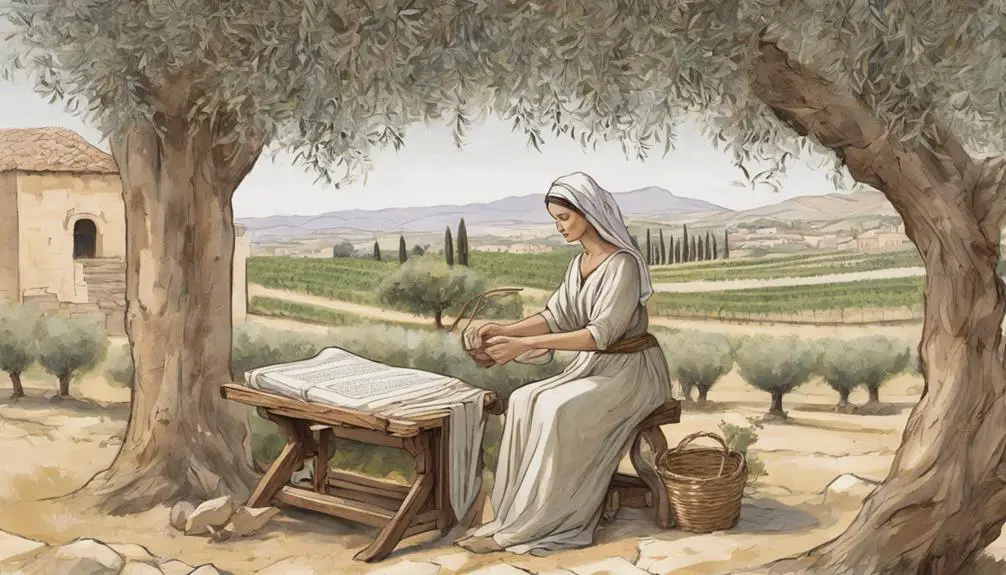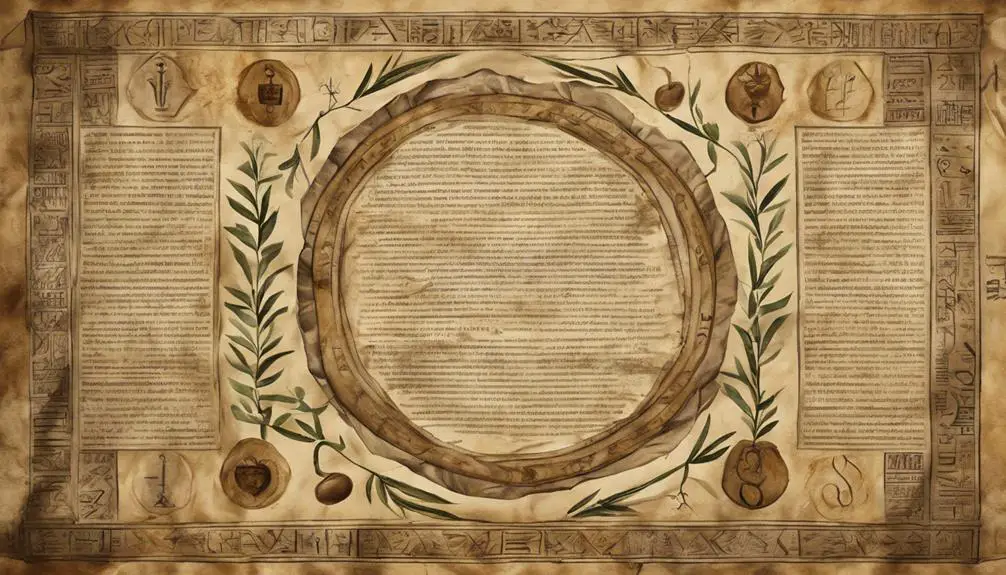Crack the code of the Proverbs 31 woman in this insightful Bible study, revealing unexpected truths and fresh perspectives.

A Proverbs 31 Bible Study Everything You Never Knew
You've likely heard of the Proverbs 31 woman, often hailed as the epitome of Christian womanhood. But how much do you really know about her?
Did you know, for instance, that Proverbs 31 was likely a mother's advice to her son, King Lemuel, about the qualities to look for in a wife?
There's so much more to uncover about this fascinating biblical figure. Stick around, you might just discover something that challenges your previous perceptions and offers fresh insights.
Key Takeaways
- The Proverbs 31 woman embodies timeless virtues such as wisdom, diligence, and industriousness, serving as a role model for all.
- Historical context and cultural norms of ancient Israel greatly influence the interpretation and understanding of Proverbs 31.
- The original Hebrew language reveals deeper meanings in Proverbs 31, such as 'Eshet Chayil' signifying a woman of valor.
- Lesser-known aspects of Proverbs 31 include the woman's spiritual nourishment for her household and her role in promoting social justice.
Understanding the Proverbs 31 Woman

Diving deep into the character of the Proverbs 31 woman, you'll find a figure who embodies wisdom, diligence, and virtue in her daily life. The text paints a picture of a woman who's industrious, a committed homemaker, and a savvy businesswoman. She's someone who wakes up early, manages her household efficiently, and isn't afraid to get her hands dirty.
You'll notice her wisdom and acumen aren't limited to domestic affairs. She's also a shrewd entrepreneur, investing in real estate, planting vineyards, and selling her products. She's not just reactive but proactive, planning for future seasons and ensuring her household's wellbeing.
Her character is marked by strength and dignity, which aren't just physical, but mental and spiritual. She's not swayed by fear of the future because her confidence lies in her faith and her wise stewardship. Her words are marked by wisdom and kindness, indicative of a strong moral compass.
She isn't just a dutiful wife or mother; she's a role model, a beacon of virtue. The Proverbs 31 woman is a paradigm of a woman of valor, reminding you that virtue, diligence, and wisdom are timeless values worth aspiring to.
Historical Context of Proverbs 31

To fully grasp the significance of the Proverbs 31 woman, it's vital to delve into the historical context in which this scripture was written. The book of Proverbs, attributed to King Solomon, dates back to the 10th century BC. It's a time in history when Israel was a theocratic monarchy, and societal norms were deeply entwined with religious beliefs.
Now, picture the Proverbs 31 woman within this historical framework. Her virtues, such as hard work, wise management, compassion, and fear of God, weren't merely personal qualities. They were a direct reflection of a societal and religious landscape that prized these attributes. Her character wasn't an isolated phenomenon but a product of her time, a testament to the expectations and values of her society.
Understanding the historical context can help you see deeper layers of the scripture. The Proverbs 31 woman isn't just an ideal woman; she's a symbol of a specific cultural moment. She embodies the values of her era, offering a window into the complex interplay of religion and social norms in ancient Israel. This perspective enriches your understanding, making the scripture more than a set of virtues—it becomes a historical document, a cultural artifact.
Linguistic Interpretations

Have you ever considered how the original Hebrew language of the Proverbs 31 scripture can shape your understanding of its meaning? The Hebrew language, rich in depth and nuance, can provide new insights and perspectives. It's important to note that Hebrew is a pictorial language, with each word painting a picture that can illuminate the scripture's message.
Take for example the term 'Eshet Chayil' found in Proverbs 31. Often translated as 'virtuous woman' or 'woman of valor', the word 'chayil' can also mean 'force', 'army', or 'wealth'. This broadens our understanding, presenting the Proverbs 31 woman not merely as virtuous, but also powerful, influential, and resourceful.
Similarly, the Hebrew word 'tam', usually translated as 'taste', is used in Proverbs 31:18. It could also mean 'to perceive' or 'discern'. Thus, the verse might suggest that the Proverbs 31 woman discerns that her merchandise is profitable rather than simply tasting it.
Therefore, delving into the original Hebrew language can enhance your comprehension of Proverbs 31, revealing dimensions of the scripture that might otherwise be overlooked in translation. It's a rewarding endeavor that can deepen your biblical study.
Cultural Influence on Proverbs 31

Beyond linguistic interpretations, it's equally important to examine how cultural context can shape our understanding of Proverbs 31. The cultural milieu of the biblical era profoundly influenced the creation of this text, so to fully grasp its meaning, you need to dive into the historical and societal norms of that time.
In ancient Israel, the woman depicted in Proverbs 31 was a model of industry, wisdom, and piety. These virtues were highly valued in a society where survival depended significantly on hard work, resourcefulness, and a deep reverence for God. This passage isn't just about a 'virtuous woman,' it's an exposition of the cultural ideals of that era.
When you consider the male-dominated society of the time, the praise and respect accorded to the Proverbs 31 woman is noteworthy. It offers a view into a culture that, despite its patriarchal structure, recognized and valued the significant role of women.
Cultural influence is key to understanding Proverbs 31. It's not enough to translate the words. You need to interpret the cultural context, the societal norms, and the historical backdrop to fully appreciate the depth of this passage. Remember, scripture never exists in a vacuum.
Lesser-Known Aspects of Proverbs 31

Delving into the lesser-known aspects of Proverbs 31, you'll uncover layers of meaning that are often overlooked in casual readings. This passage, commonly known as "The Virtuous Woman", has more to explore than the surface-level attributes of an ideal woman.
Verse |
Lesser-known Aspect |
|---|---|
Verse 10 |
The Hebrew word 'Chayil', translated as 'virtuous', also means 'strength', 'wealth', or 'army', suggesting a woman of power and influence. |
Verse 15 |
The phrase 'provides food for her household' implies not just physical nourishment, but spiritual and emotional sustenance as well. |
Verse 20 |
'She extends her hands to the poor' could be interpreted as an encouragement for women to engage in social justice. |
Verse 30 |
The woman's fear of the Lord is her defining characteristic, not physical beauty or charm, challenging societal norms. |
Conclusion
In conclusion, understanding Proverbs 31 requires you to delve into the historical context, linguistic interpretations, and cultural influences.
It's not just about the virtuous woman, but the societal expectations, the symbolism, and the lesser-known aspects.
This study encourages you to question, explore, and ultimately deepen your grasp of this Biblical passage.
It's a journey that will enrich your understanding of scripture, challenge your perceptions, and offer fresh insights into Proverbs 31.



Sign up